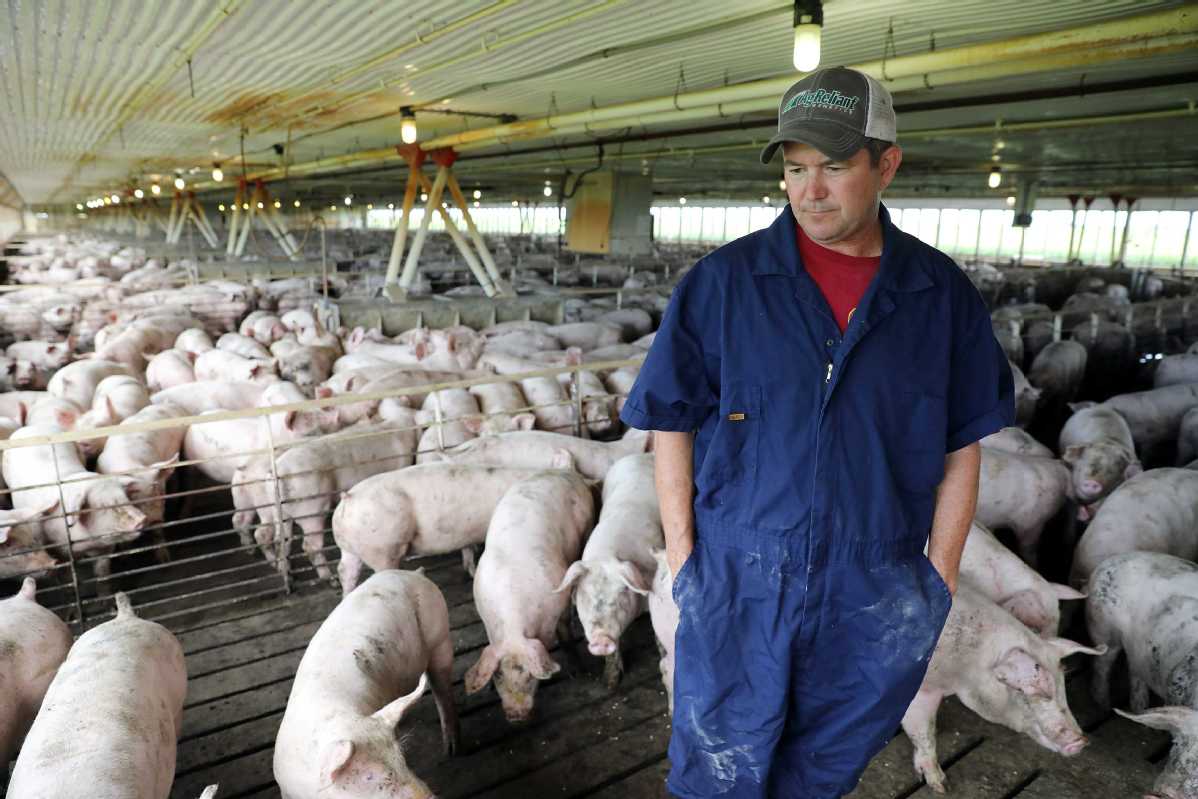US farmers risk losing the market in China


Beijing can boost agricultural imports from elsewhere, senior official says
China can minimize the impact of raising tariffs on farm products from the United States by increasing imports from other countries and adjusting domestic agricultural patterns, but the US may lose the Chinese market that its farmers have been exploring for decades, a senior official in charge of agriculture has said.
Despite the plan by the administration of US President Donald Trump for up to $12 billion in subsidies for US farmers and the initial agreement with the European Union to increase imports of US soybeans to Europe, the US farm sector will suffer greatly due to the loss of the huge Chinese market, said Han Jun, deputy head of the Office of the Central Leading Group for Rural Affairs and vice-minister of agriculture and rural affairs, in an interview on Thursday.
However, China does not want to see the escalation of China-US trade friction, and most people in the two countries do not want trade relations between the two countries to reach a stalemate, he said.
"Negotiation is the only way to resolve trade disputes between the two countries," he said. "For China, the door for negotiation will not close. China will pay attention to US concerns in agriculture, but the US should not make unreasonably high demands on China."
In response to the US imposition of rising tariffs on Chinese goods, China has since July 6 begun to levy additional 25 percent tariffs on 517 types of agricultural products — including soybeans, cotton and pork — imported from the US. The total value of these imports last year was about $21 billion, Han said.
Last week, China announced that it might levy different levels of additional tariffs on US goods worth $60 billion, in response to US threats to impose additional tariffs on Chinese goods worth $200 billion.
Han said the list will include 387 kinds of agricultural products, so almost all agricultural products from the US will face additional tariffs once the latest countermeasures by China take effect.
"China made the countermeasures after extensively soliciting opinions and careful evaluations of the effects, and they are rational and restrained," he said.
Han said China and the US are strongly complementary in agricultural trade. "China has huge demand for import of agricultural products, with its population growth and rising living standards of its people, and it will keep expanding imports," he said. "We hope to see a healthy agricultural trade relations between the two countries, so US farmers also get benefits. However, the US has kept escalating trade frictions, regardless of a consensus already made between the two countries."
Han said China will closely evaluate the effects caused by its countermeasures to the tariff measures imposed by the US to minimize their impact on domestic production and people's livelihood.
"Levying additional tariffs will cause a great decrease in the export of US agricultural products to China," he said. "But the impact on China is very limited, due to multiple import resources for China."
"If a trade war breaks out between China and the US, many other countries will be willing and able to replace the US share of agricultural products in the Chinese market."
Escalation of trade frictions between the two countries will result in higher costs for US agricultural products entering China, and the US share of the market will be significantly reduced, which will favor its competitors, he said.
"Once other countries have become reliable suppliers of agricultural goods for China, it will be very difficult for the US agricultural producers to regain the Chinese market," he said.
Han said additional tariffs would cause a great decrease in China's imports of soybeans from the US, the most important product of China-US agriculture trade.
But China is fully prepared and is capable of bridging the gap in reduced supply from the US through various measures, including increasing imports from other countries, promoting alternatives to animal feed made of soybeans in the poultry and husbandry industries to reduce domestic consumption of soybeans, and increasing domestic planting of soybeans, he said.
China relies on imports for most of its soybean consumption, with the US being the second-largest source of imports for China, after Brazil. Nearly 60 percent of all exported soybeans from the US went to China between 2015 and last year.
China could reduce imports of soybeans by more than 10 million metric tons this year — down by more than 10 percent from last year — because of expanding domestic production and the promotion of soybean substitutes, Chinese experts have predicted.
Han said China may also increase soybean imports from countries such as Brazil to meet its increasing demand.
Han also said China and the US had some fruitful negotiations on agricultural trade in June, during which the two sides reached initial agreements that China would increase imports of US agricultural products by a large margin. However, the US unilaterally provoked conflicts, so the negotiation achievements have become invalid, he said.
Despite the agreement by the EU to import more soybeans from the US, it is estimated that the EU could only import between 13 million and 14 million metric tons of soybeans each year over the next 10 years — compared with more than 30 million metric tons imported from the US by China last year — so it would be impossible for the US to handle all the soybeans in surplus, Han said.
"People of all walks of life in agriculture in the US have expressed worries over losing the Chinese market," he said.
The additional tariff measures carried out on July 6 by the US did not include agricultural products imported from China, but most aquatic products, fruits and vegetables exported to the US will be covered by a second round of tariff measures likely to be imposed by the US, which would involve Chinese goods with a total value of $200 billion, Han said.
The Chinese government will take measures such as helping producers to find alternative export destinations and exploring domestic market opportunities to minimize the impact, he said.
Contact the writer at wangxiaodong@chinadaily.com.cn
































